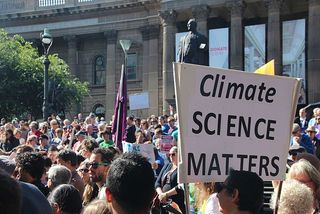Environment
Science and a Free Society
Science is a force for the very freedoms that Americans hold dear.
Posted February 1, 2020

Ignoring Climate Science Is Only the Tip of Iceberg
Following the hottest and driest year on record in Australia, enormous wildfires, which have by now persisted for months, have consumed millions of acres and more than 3,000 homes. At least 29 people have died, and scientists estimate that as many as a half-billion (that is “billion” with a “b”) animals have perished.
The resulting cloud of smoke is about the same size as the land area of the continental United States. Along with record heat in Europe this past summer, greater numbers of ever-more-powerful hurricanes, extensive melting of ice in Greenland and the Arctic, massive flooding in the Midwest, and fires across the American West, the current Australian conflagration has ensured that climate change and global warming have remained at the forefront of North Americans’ attention, even in the middle of their winter.
Inattention to both the danger that climate change poses for the future of our species and the role that humans’ activities are having in its provocation is probably the most conspicuous illustration of the current American administration’s rejection of the standards, methods, and findings of science. It is, however, by no means the only one. In a recent article, Brad Plumer and Coral Davenport outline the many ways in which the Trump administration has worked to exclude science in the federal government.
Sidelining Science
Plumer and Davenport provide plentiful examples across multiple agencies of the federal government, including the Agriculture, Commerce, and Interior Departments, of directives to stifle scientific research in one way or another. Those examples range from such things as canceling a study on the health effects of mountaintop-removal coal mining to cutting funding for a study on the impact of various chemicals on pregnant women.
They also document a variety of ways in which the current administration has moved to discourage, if not eliminate, the application of scientific findings, standards, and methods to empirical questions pertaining to a variety of public policy issues. Illustrations include the Commerce Department’s decision to eliminate a scientific advisory committee devoted to rendering National Climate Assessments more accessible and practicable for local governments. One of the most telling and dramatic instances on which they report concerned a cease-and-desist order sent to the National Park Service’s leading climate scientist after he had testified to Congress about the threat that global warming poses for the national parks.
What is simultaneously the most ironic and the most egregious case they describe is a newly proposed rule for the Environmental Protection Agency (EPA). That rule would prohibit government regulators in the EPA from appealing in their official judgments to any scientific research for which the data informing that research is unavailable to the public. On the face of it, this might appear to champion the concern among scientists for openness in research—a worthy value, indeed.
Appearances, however, can be deceiving. This measure would block reference to all research findings that relied upon protecting the privacy of research participants in medical studies, which is to say that it would forbid reference to evidence from nearly all medical studies. Practicing scientists understand that when these two values conflict, the default assumption is that participants’ confidentiality is paramount.
If it is anything other than a simple political ploy, this measure reflects a misunderstanding of the sort of population thinking that informs such research. In addition to violating their confidentiality, access to the details of individual participants’ medical histories is, from a statistical standpoint, irrelevant to the soundness of the findings about the population sample. In smaller-scale studies in which individuals’ medical histories might pertain, researchers typically discuss them collectively, anonymously, or both.
Science as a Force for Human Freedom
Neglecting the most up-to-date science bearing on such matters as public health and environmental sustainability is imprudent in the extreme, as science remains second to none in generating knowledge about the empirical world. This is not to imply that scientific facts and findings settle questions of public policy, as many other interests and values must be weighed as well. It does suggest, though, that policy decisions, uninformed by science, are less well-made than they would otherwise be.
The prominent 20th-century philosopher of science, Karl Popper, argued that however valuable its empirical findings and practical consequences, science’s ability to liberate human thought was even more important. He maintained that “science is valued for its liberalizing influence—as one of the greatest of the forces that make for human freedom.” On Popper’s account, the various measures of the current American administration to inhibit science are, finally, threats to a free and open society.
References
Popper, Karl. (1992). Conjectures and Refutations: The Growth of Scientific Knowledge. New York: Routledge, p. 102




